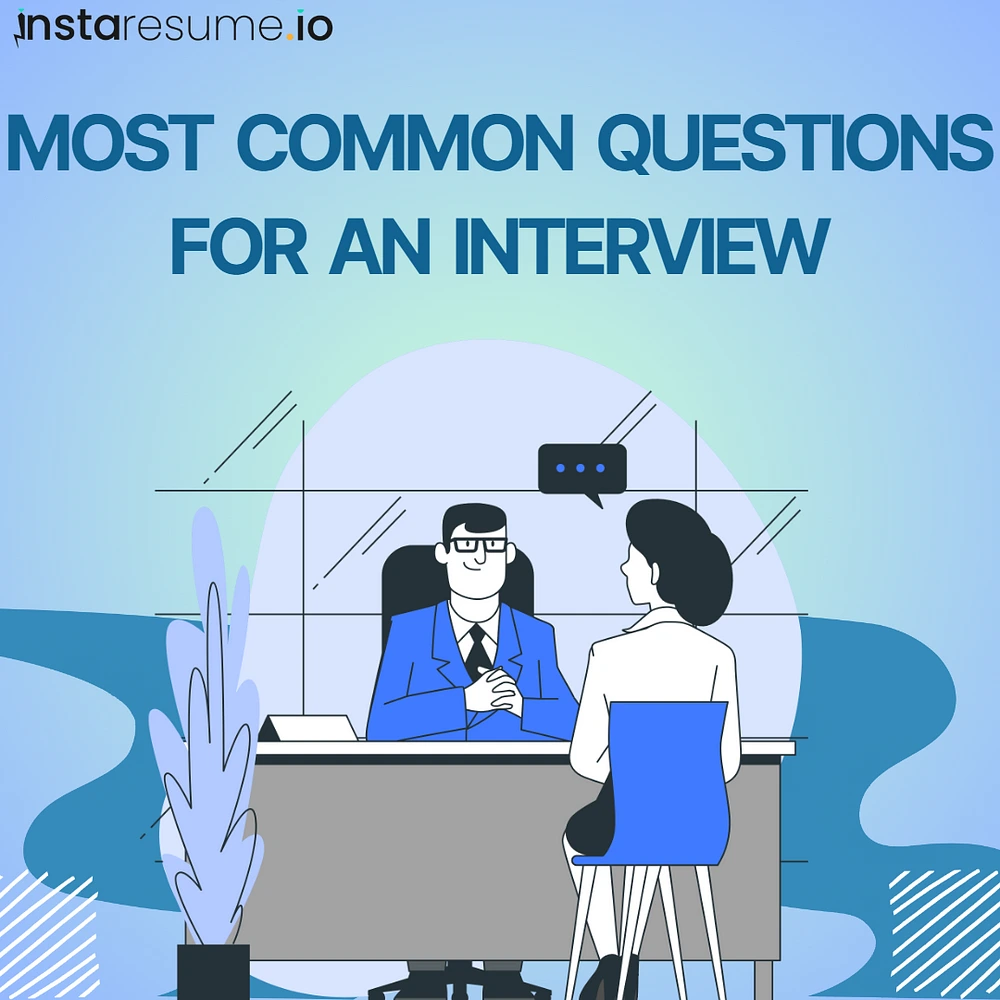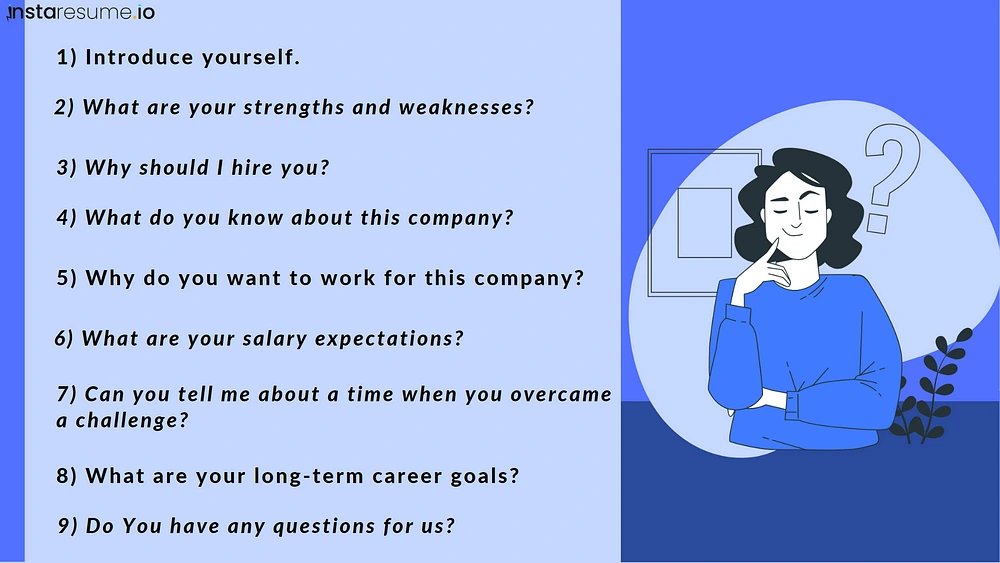Most common questions for an Interview: 2023
Job interviews are an opportunity for you to showcase your skills, experiences, and personality. By being prepared and presenting yourself confidently, you can increase your chances of success in job interviews.

Most Common interview questions
When preparing for a job interview, it's essential to anticipate the questions that the interviewer may ask. While every interview is unique, there are some common questions that tend to be asked in many interviews. In this blog, we'll explore some of the most common but typical questions for job interviews and how to answer them effectively.

Most common and typical questions for job interviews
1) Introduce yourself.
This is usually the first question asked in many job interviews. While it seems like an easy question, it can be tricky to answer if you're not prepared. The key here is to give a brief introduction of your professional background, skills, and accomplishments. Avoid going into too much detail or sharing personal information irrelevant to the job.
2) What are your strengths and weaknesses?
When asked about your strengths, it's important to highlight your key skills and achievements that align with the job requirements. When it comes to weaknesses, try to turn them into opportunities for improvement. For example, if you struggle with public speaking, you can say you're improving your communication skills through public speaking courses or other training.
This question is often seen as challenging by many candidates, even those with significant experience. However, if approached correctly it is easily possible to avoid ‘bragging' when discussing your strengths or seeming excessively negative when talking about your perceived weaknesses.
Strengths- Based on the job description, choose three examples of traits the employer is looking for and give examples of how you have used these strengths in a work situation. Ideally, include a mixture of tangible skills, such as technical or linguistic abilities, and intangible skills, such as management experience.
Weaknesses — The best approach here is to pick a trait that you have already made positive steps to address.
3) Why should I hire you?
When answering this question in an interview, it's important to highlight your unique strengths and qualifications that make you the best fit for the job. Provide specific examples from your past experiences that demonstrate your suitability for the role and how you can add value to the company. Be confident, authentic, and enthusiastic in your response, and emphasize how you can contribute to the success of the organization.
4) What do you know about this company?
So this question's primary purpose is company. Other than your weaknesses and strengths this answer will determine your job interview. To answer this question you should be well-versed in the role of the company.
Do your research: You must visit the company website and go through the website thoroughly. Understand their business/ services, how they work as well as their products.
Highlight key points: Identify the key issues or unique aspects of the company that stand out to you.
Be specific: Avoid generic or vague statements and instead provide specific examples or anecdotes to illustrate your knowledge about the company.
For example, you can mention a recent award or a title the company received, a successful project they completed, or a positive and powerful impact they made in their industry.
Pro Tip: Always try to answer with examples. By giving examples you're indicating your interest and awareness about the company.
5) Why do you want to work for this company?
This question shows the interviewer that you've researched the company and are genuinely interested in working for them. Take some time to learn about the company's values, culture, and mission statement, and tie them into your answer. You can also mention specific projects or initiatives that you find interesting and how you can contribute to them.
6) What are your salary expectations?
This can be a tricky question to answer, as you don't want to sell yourself short or come across as too demanding. The key here is to do your research on the industry standards for the position you're applying for and provide a salary range based on that information. It's also important to factor in your experience, skills, and qualifications.
7) Can you tell me about a time when you overcame a challenge?
This is a behavioural question that seeks to evaluate your problem-solving skills and resilience. When answering this question, provide a specific example of a challenging situation you faced, what actions you took to overcome it, and what the outcome was. Be sure to highlight your problem-solving skills and how you were able to adapt and learn from the experience.
8) What are your long-term career goals?
This question helps the interviewer understand your career aspirations and how they align with the company's growth and development. Be honest and specific about your goals, and how you plan to achieve them. You can also tie your long-term goals to the job you're applying for and how it can help you develop the necessary skills and experiences.
9) Do You have any questions for us?
This is usually the last question asked in an interview and is an opportunity for you to demonstrate your interest in the company and the position. Prepare questions beforehand that show your understanding of the company, the role, and how you can contribute to it. Examples of questions could include asking about the company's culture, growth opportunities, or how success is measured in the position.
Examples
Further, you can refer to below given sample interview questions and answers :
Data Analyst
Question: Tell me about your experience with data analysis and how you've used it in your previous roles.
Answer: In my previous roles, I have been responsible for analyzing large datasets to extract actionable insights and inform decision-making.
For example, in my last job, I analyzed customer data to identify patterns and trends, which helped optimize marketing campaigns and increase customer engagement.
I have also conducted exploratory data analysis to identify data quality issues and worked with stakeholders to implement data quality improvement strategies.
Full stack developer
Ques: How do you approach debugging and troubleshooting in your development process?
Answer: Debugging and troubleshooting are critical skills for a Full Stack Developer. When facing an issue, I start by reproducing the problem and thoroughly analyzing the code, logs, and error messages to identify the root cause. I use debugging tools and techniques, such as logging, breakpoint debugging, or browser developer tools, to pinpoint the issue.
I also collaborate with team members and seek help from relevant resources, such as documentation or online forums, if needed. Once the issue is identified, I develop and implement a solution, thoroughly test it, and document the resolution for future reference.
Software Engineer
Ques: Describe a challenging technical problem and how you solved it.
Answer: In my previous job, we faced a performance issue in one of our web applications that were causing slow response times. After conducting a thorough analysis and profiling, I identified a bottleneck in the database query.
I optimized the query by redesigning the database schema and caching the results. This resulted in a significant performance improvement, reducing the response time by 50%. I also implemented automated monitoring and alerting to quickly detect and resolve any future performance issues.
Financial Advisor
Ques: How do you stay updated with the latest trends and changes in the financial industry?
Answer: As a Financial Advisor, it is essential to stay up-to-date with the latest trends and changes in the financial industry. I regularly participate in industry conferences, webinars, and workshops to enhance my knowledge and skills.
I also read financial publications, and research reports, and follow reputable financial news sources to stay informed about market trends, regulatory changes, and economic developments.
Additionally, I maintain professional certifications and licenses, and I am committed to continuous learning to provide the best advice and service to my clients.
Graphic Designer
Ques: How do you stay inspired and motivated in your creative work?
Answer: As a Graphic Designer, I understand the importance of staying inspired and motivated to produce creative work. I draw inspiration from various sources, such as design blogs, social media, art exhibitions, and everyday life experiences.
I also engage in continuous learning and professional development by attending workshops, webinars, and design events. Collaborating with other creative professionals and receiving feedback from clients and colleagues also motivates me to improve my skills and push my creative boundaries.
Additionally, I practice time management, set realistic goals, and break down projects into smaller tasks to stay organized and focused on achieving my design objectives.
Conclusion
In conclusion, preparing for a job interview requires anticipating common questions that may be asked by the interviewer. By understanding these questions and how to answer them effectively, you can increase your chances of impressing the interviewer and landing the job. Remember to research the company and the position, and tailor your answers to showcase your skills, experience, and qualifications.

